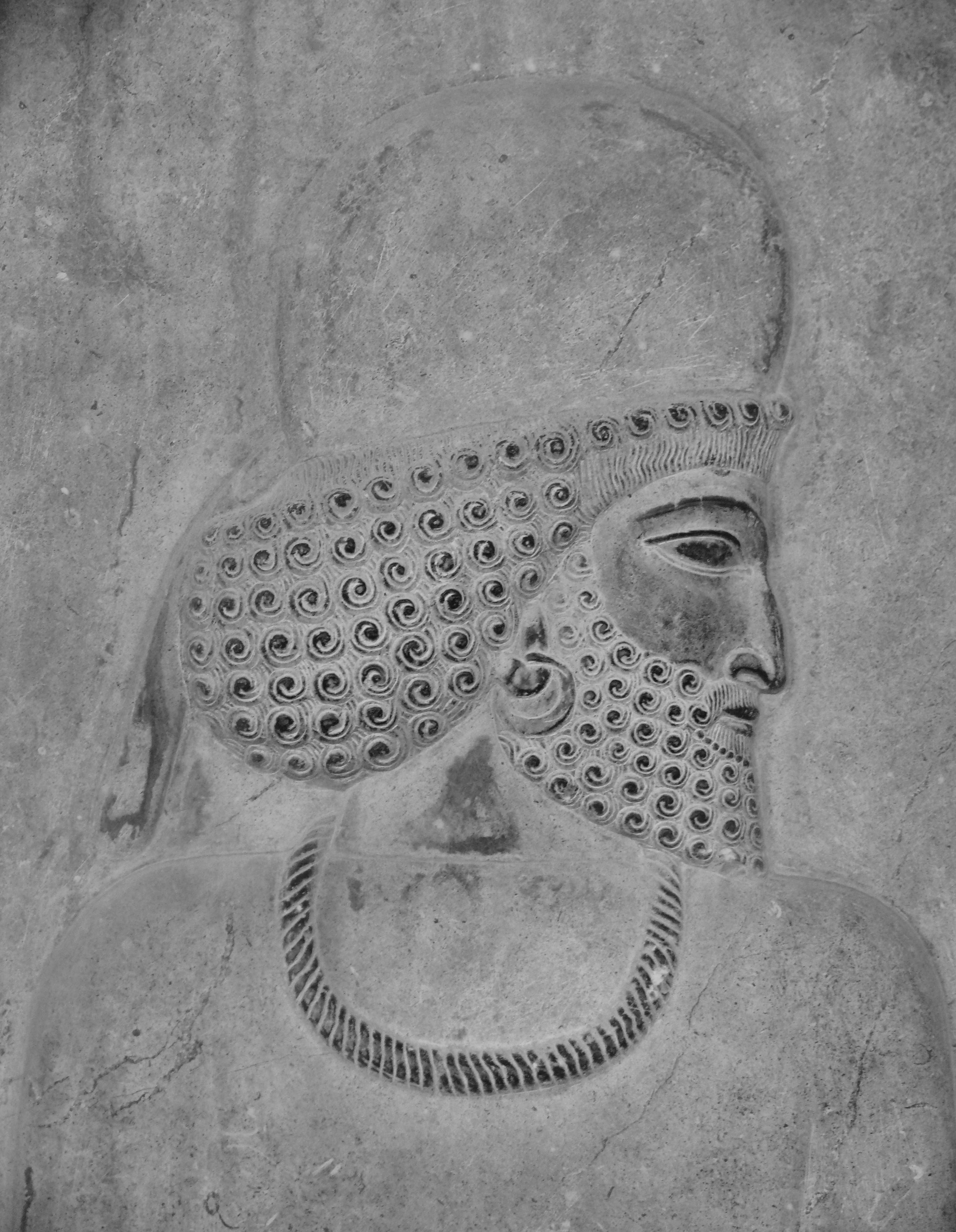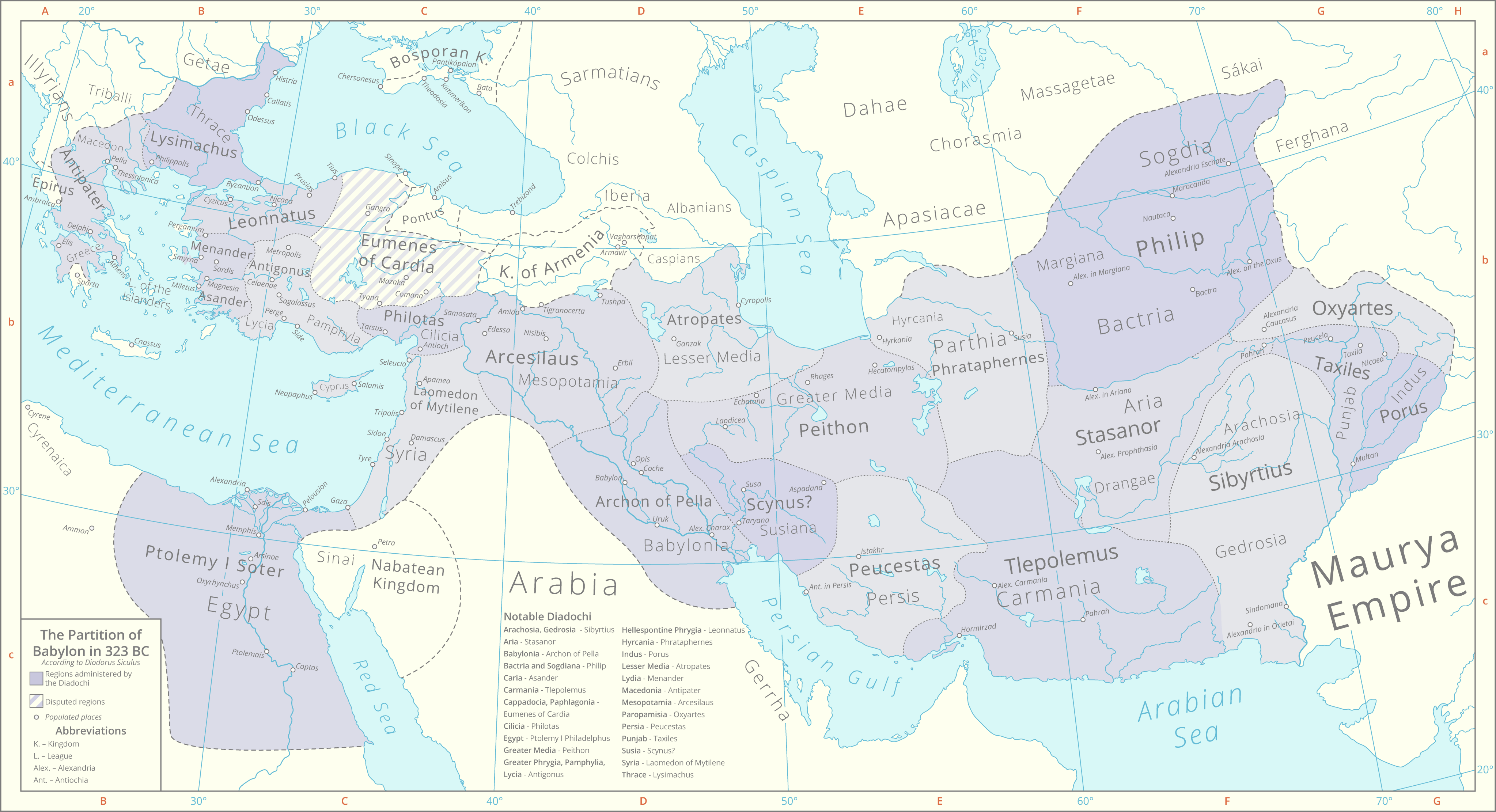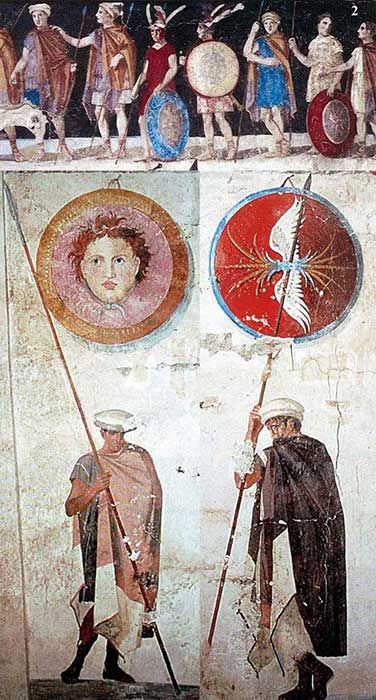|
Atropates
Atropates ( peo, *Ātr̥pātaʰ and Middle Persian ; grc, Ἀτροπάτης ; c. 370 BC - after 321 BC) was a Persian nobleman who served Darius III, then Alexander the Great, and eventually founded an independent kingdom and dynasty that was named after him. Diodorus (18.4) refers to him as (), while Quintus Curtius (8.3.17) erroneously names him 'Arsaces'. Biography Towards the end of the Achaemenid Empire, Atropates was governor (''satrap'') of the Achaemenid province of Media. In the decisive Battle of Gaugamela (October 331 BCE) between Darius and Alexander, Atropates commanded the Achaemenid troops of Media and Sacasene. Following his defeat in that battle, Darius fled to the Median capital of Ecbatana, where Atropates gave him hospitality. Darius attempted to raise a new army but was forced to flee Ecbatana in June 330 BCE. After Darius' death a month later at the hands of Bessus, Atropates surrendered to Alexander. Alexander initially chose Oxydates as satra ... [...More Info...] [...Related Items...] OR: [Wikipedia] [Google] [Baidu] |
Atropatene
Atropatene ( peo, Ātṛpātakāna; grc, Ἀτροπατηνή), also known as Media Atropatene, was an ancient Iranian kingdom established in by the Persian satrap Atropates. The kingdom, centered in present-day northern Iran, was ruled by Atropates' descendants until the early 1st-century AD, when the Parthian Arsacid dynasty supplanted them. It was conquered by the Sasanians in 226, and turned into a province governed by a ''marzban'' ("margrave"). Atropatene was the only Iranian region to remain under Zoroastrian authority from the Achaemenids to the Arab conquest without interruption, aside from being briefly ruled by the Macedonian king Alexander the Great (). The name of Atropatene was also the nominal ancestor of the name of the historic Azerbaijan region in Iran. Name According to Strabo, the name of Atropatene derived from the name of Atropates, the commander of the Achaemenid Empire. As he writes in his book “Geography”: "Media is divided into two parts. One ... [...More Info...] [...Related Items...] OR: [Wikipedia] [Google] [Baidu] |
Oxydates
Oxydates ( Old Persian: ''Waxsu-data'') was a Persian nobleman, who served as the satrap of Media under the Macedonian king Alexander the Great () from 330 BC to 328 BC. Before his appointment, Oxydates had for an unknown reason been imprisoned at Susa by his former suzerain, the Achaemenid ruler Darius III (). He was eventually found and released by Alexander, whom he accompanied to Rhagae. It was during that period Oxydates was appointed satrap of Media, thus replacing Atropates. However, he was convicted of misconduct in late 328 BC, and thus lost his office to Atropates. It unknown what happened to Oxydates afterwards. He may have been arrested or executed by Atropates at the instruction of Alexander, or even managed to escape. Following Oxydates' dismissal, a Mede named Baryaxes rebelled, donning a upright tiara A tiara (from la, tiara, from grc, τιάρα) is a jeweled head ornament. Its origins date back to ancient Greece and Rome. In the late 18th century, the tiar ... [...More Info...] [...Related Items...] OR: [Wikipedia] [Google] [Baidu] |
Media (region)
Media ( peo, 𐎶𐎠𐎭, Māda, Middle Persian: ''Mād'') is a region of north-western Iran, best known for having been the political and cultural base of the Medes. During the Achaemenid period, it comprised present-day Azerbaijan, Iranian Kurdistan and western Tabaristan. As a satrapy under Achaemenid rule, it would eventually encompass a wider region, stretching to southern Dagestan in the north. However, after the wars of Alexander the Great, the northern parts were separated due to the Partition of Babylon and became known as '' Atropatene'', while the remaining region became known as ''Lesser Media''. History Under the Medes In 678 BC, Deioces united the Median tribes of Media and made the first Iranian Empire. His grandson Cyaxares managed to unite all Iranian tribes of Ancient Iran and made his empire a major power. When Cyaxares died he was succeeded by his son, Astyages, who was the last king of the Median Empire. Under the Achaemenids In 553 BC, Cyrus the Gr ... [...More Info...] [...Related Items...] OR: [Wikipedia] [Google] [Baidu] |
Partition Of Babylon
The Partition of Babylon was the first of the conferences and ensuing agreements that divided the territories of Alexander the Great. It was held at Babylon in June 323 BC. Alexander’s death at the age of 32 had left an empire that stretched from Greece all the way to India. The issue of succession resulted from the claims of the various supporters of Philip Arrhidaeus (Alexander’s half-brother), and the as-of-then unborn child of Alexander and Roxana, among others. The settlement saw Arrhidaeus and Alexander’s child designated as joint kings with Perdiccas serving as regent. The territories of the empire became satrapies divided between the senior officers of the Macedonian army and some local governors and rulers. The partition was solidified at the further agreements at Triparadisus and Persepolis over the following years and began the series of conflicts that comprise the Wars of the Diadochi. The term "Partition of Babylon" is a modern designation. Definition of pa ... [...More Info...] [...Related Items...] OR: [Wikipedia] [Google] [Baidu] |
Diadochi
The Diadochi (; singular: Diadochus; from grc-gre, Διάδοχοι, Diádochoi, Successors, ) were the rival generals, families, and friends of Alexander the Great who fought for control over his empire after his death in 323 BC. The Wars of the Diadochi mark the beginning of the Hellenistic period from the Mediterranean Sea to the Indus River Valley. The most notable Diadochi include Ptolemy I Soter, Ptolemy, Antigonus I Monophthalmus, Antigonus, Cassander, and Seleucus I Nicator, Seleucus as the last remaining at the end of the Wars of the Diadochi, Wars of the Successors, ruling in Egypt, Anatolia, Asia-Minor, Macedonia (ancient kingdom), Macedon and Iran, Persia respectively, all forging dynasties lasting several centuries. Background Ancient role In ancient Greek, is a noun (substantive or adjective) formed from the verb, ''diadechesthai'', "succeed to," a compound of ''dia-'' and ''dechesthai'', "receive." The word-set descends straightforwardly from Proto-Ind ... [...More Info...] [...Related Items...] OR: [Wikipedia] [Google] [Baidu] |
Peithon
Peithon or Pithon (Greek: ''Πείθων'' or ''Πίθων'', 355 – 314 BC) was the son of Crateuas, a nobleman from Eordaia in western Macedonia. He was famous for being one of the bodyguards of Alexander the Great, becoming the later satrap of Media, and claiming to be one of the diadochi. Peithon was named one of the seven (later eight) Somatophylakes "bodyguards" of Alexander in 335 BC. After Alexander's death in 323 BC, Peithon was made the satrap of Media, the strategically important region that controlled all roads between east and west. The satrapy was too large for one man; Peithon would be very powerful, and could destabilize the entire empire. Therefore, he had to give up the northern part, which was given to Atropates; from then on the region was known as Media Atropatene. The soldiers who remained in the eastern part of Alexander's realm after his death grew agitated by their lengthy stay abroad, and began spontaneous revolts. The regent Perdiccas sent ... [...More Info...] [...Related Items...] OR: [Wikipedia] [Google] [Baidu] |
Perdiccas
Perdiccas ( el, Περδίκκας, ''Perdikkas''; 355 BC – 321/320 BC) was a general of Alexander the Great. He took part in the Macedonian campaign against the Achaemenid Empire, and, following Alexander's death in 323 BC, rose to become supreme commander of the imperial army, as well as regent for Alexander's half brother and intellectually disabled successor, Philip Arridaeus (Philip III). He was the first of the Diadochi who fought for control over Alexander's empire. In his attempts to establish a power base and stay in control of the empire, he managed to make enemies of critical generals in the Macedonian army—including Antipater, Craterus and Antigonus—who decided to revolt against the regent. In response to this formidable coalition and a provocation from another general, Ptolemy, Perdiccas invaded Egypt, but his soldiers revolted and killed him when the invasion foundered. Family background According to Arrian, Perdiccas was the son of the Macedonian ... [...More Info...] [...Related Items...] OR: [Wikipedia] [Google] [Baidu] |
Battle Of Gaugamela
The Battle of Gaugamela (; grc, Γαυγάμηλα, translit=Gaugámela), also called the Battle of Arbela ( grc, Ἄρβηλα, translit=Árbela), took place in 331 BC between the forces of the Army of Macedon under Alexander the Great and the Persian Army under King Darius III. It was the second and final battle between the two kings, and is considered to be the final blow to the Achaemenid Empire, resulting in its complete conquest by Alexander. The fighting took place in Gaugamela, which literally meant "The Camel's House", a village on the banks of the river Bumodus. The area today would be considered modern-day Erbil, Iraq, according to Urbano Monti's world map. Alexander's army was heavily outnumbered and modern historians say that "the odds were enough to give the most experienced veteran pause". Despite the overwhelming odds, Alexander's army emerged victorious due to the employment of superior tactics and the clever usage of light infantry forces. It was a ... [...More Info...] [...Related Items...] OR: [Wikipedia] [Google] [Baidu] |
Diadochi Satraps Babylon
The Diadochi (; singular: Diadochus; from grc-gre, Διάδοχοι, Diádochoi, Successors, ) were the rival generals, families, and friends of Alexander the Great who fought for control over his empire after his death in 323 BC. The Wars of the Diadochi mark the beginning of the Hellenistic period from the Mediterranean Sea to the Indus River Valley. The most notable Diadochi include Ptolemy, Antigonus, Cassander, and Seleucus as the last remaining at the end of the Wars of the Successors, ruling in Egypt, Asia-Minor, Macedon and Persia respectively, all forging dynasties lasting several centuries. Background Ancient role In ancient Greek, is a noun (substantive or adjective) formed from the verb, ''diadechesthai'', "succeed to," a compound of ''dia-'' and ''dechesthai'', "receive." The word-set descends straightforwardly from Indo-European *dek-, "receive", the substantive forms being from the o-grade, *dok-. Some important English reflexes are dogma, "a receiv ... [...More Info...] [...Related Items...] OR: [Wikipedia] [Google] [Baidu] |
Seleucid Empire
The Seleucid Empire (; grc, Βασιλεία τῶν Σελευκιδῶν, ''Basileía tōn Seleukidōn'') was a Greek state in West Asia that existed during the Hellenistic period from 312 BC to 63 BC. The Seleucid Empire was founded by the Macedonian general Seleucus I Nicator, following the division of the Macedonian Empire originally founded by Alexander the Great. After receiving the Mesopotamian region of Babylonia in 321 BC, Seleucus I began expanding his dominions to include the Near Eastern territories that encompass modern-day Iraq, Iran, Afghanistan, Syria, all of which had been under Macedonian control after the fall of the former Persian Achaemenid Empire. At the Seleucid Empire's height, it had consisted of territory that had covered Anatolia, Persia, the Levant, and what are now modern Iraq, Kuwait, Afghanistan, and parts of Turkmenistan. The Seleucid Empire was a major center of Hellenistic culture. Greek customs and language were privileged; the wide va ... [...More Info...] [...Related Items...] OR: [Wikipedia] [Google] [Baidu] |
Araxes River
, az, Araz, fa, ارس, tr, Aras The Aras (also known as the Araks, Arax, Araxes, or Araz) is a river in the Caucasus. It rises in eastern Turkey and flows along the borders between Turkey and Armenia, between Turkey and the Nakhchivan exclave of Azerbaijan, between Iran and both Azerbaijan and Armenia, and, finally, through Azerbaijan where it flows into the Kura river. It drains the south side of the Lesser Caucasus Mountains while the Kura drains the north side of the Lesser Caucasus. The river's total length is and its watershed covers an area of . The Aras is one of the longest rivers in the Caucasus. Names In classical antiquity, the river was known to the Greeks as Araxes ( gr, Ἀράξης). Its modern Armenian name is ''Arax'' or ''Araks'' ( hy, Արաքս). Historically it was also known as ''Yeraskh'' ( xcl, Երասխ) and its Old Georgian name is ''Rakhsi'' (). In Azerbaijani, the river's name is ''Araz''. In Persian and Kurdish its name is (''Aras''), a ... [...More Info...] [...Related Items...] OR: [Wikipedia] [Google] [Baidu] |
Philip III Of Macedon
Philip III Arrhidaeus ( grc-gre, Φίλιππος Ἀρριδαῖος ; c. 359 BC – 25 December 317 BC) reigned as king of Macedonia an Ancient Greek Kingdom in northern Greece from after 11 June 323 BC until his death. He was a son of King Philip II of Macedon by Philinna of Larissa, and thus an elder half-brother of Alexander the Great. Named Arrhidaeus at birth, he assumed the name Philip when he ascended to the throne. As Arrhidaeus grew older it became apparent that he had mild learning difficulties. Plutarch was of the view that he became disabled by means of an attempt on his life by Philip II's wife, Queen Olympias, who wanted to eliminate a possible rival to her son, Alexander, through the employment of ''pharmaka'' (drugs/spells); however, most modern authorities doubt the truth of this claim. Alexander was fond of Arrhidaeus and took him on his campaigns, both to protect his life and to prevent his use as a pawn in any prospective challenge for the throne. After ... [...More Info...] [...Related Items...] OR: [Wikipedia] [Google] [Baidu] |








.jpg)
